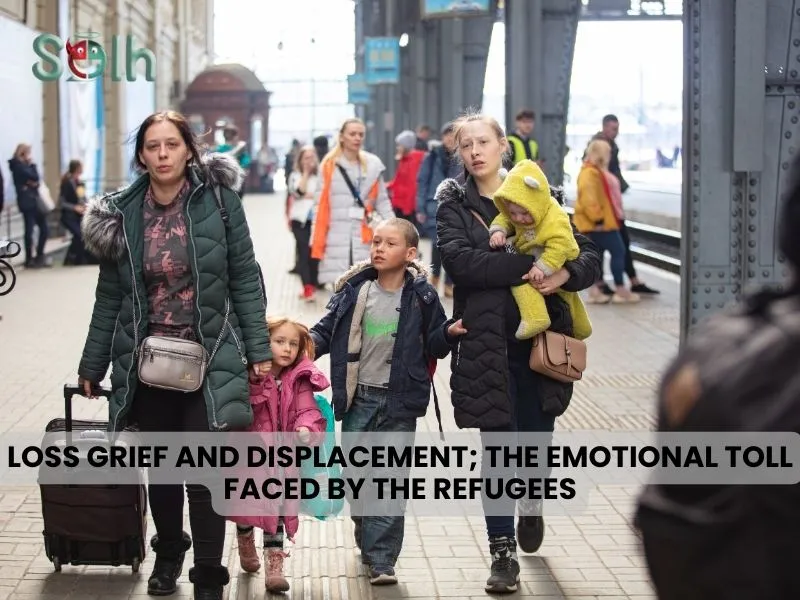The new super-connected world foists a continuous ex-gratis view of others' lives as they wash one picture after another of friends who are supposedly at fanciful parties, jet-setting all over, or having a splendid time with others. Such regular-connect momentarily perverts one feeling-geocentric: FOMO or the "Fear of Missing Out." The slightly nervous feeling where we reflect that others are having fun without us. But why do we have this mentality that is, essentially, a fear of missing out, and what does that do to our mental health? This post is aimed at revealing the psychology of FOMO that manifests in daily life and offers suggestions to combat its negative influence.
What Is FOMO?
FOMO denotes the fear, or anxiety , of another person having much more fun, rewards, or fulfillment than herself or himself at that moment. This is probably triggered by a feeling of exclusion from precious experiences and generates a spectrum of emotional responses, from mild anxiety to deep feelings of worthlessness and disgrace.
However, in the current digital age, with the advent of social platforms such as Instagram, Facebook, and Twitter people showcase the glittering representation of their lives-FOMO acquires a much wider connotation at the most deadly gradations. The fear of losing something out-may be it social activities, social events, or life moments-whole of it creates plenty of existence that flies amidst reality urging a constant level of urgency to catch up with everything around. These could be a friend's vacation pictures, a concert you weren't invited to, or a professional achievement that feels altogether beyond reach to you. FOMO is an emotional manifestation that sways your perception of what's possible.
The Psychology Behind FOMO
Why do we fear missing out in the first place? The answer lies in our evolutionary psychology. As social beings, humans have evolved to prioritize belonging to a group. Historically, our survival depended on forming strong social bonds and participating in group activities. Being excluded from important social gatherings could mean missing out on valuable information, resources, or even protection. In other words, our brains are wired to value social connection and fear being left out.
Psychologists also point to social comparison theory , which suggests that people naturally evaluate themselves based on how they measure up to others. When we see people on social media engaging in activities that we perceive as more exciting or successful than what we're doing, we feel inadequate. This leads to the perception that our lives are lacking, even though we may be unaware that the posts we see online are often carefully curated, highlighting only the most appealing moments.
The rise of social media has further intensified these feelings. With the constant flow of updates and notifications, we are always aware of what others are doing, making it harder to focus on our own experiences without comparison. This creates an environment where we feel pressured to be doing something "cool" at all times or risk being left out of the social loop.
How FOMO Affects Our Mental Health
While a mild case of FOMO may be fleeting, prolonged exposure to these feelings can take a toll on our mental health. Below are some of the ways in which FOMO can negatively impact our well-being:
1. More Anxiety and Stress
FOMO may lead to anxiety and stress, especially when we sense that we are missing out on something significant. The fear of not attending a social gathering, or worse still, being excluded from a clique, can trigger feelings of agitation. This anxiety usually arises due to the fear of being left behind or failing to meet expectations. It can cause the constant need to monitor social media posts, which generates a cycle of stress that's difficult to break.
2. Low Self-Esteem
Repeated comparisons of our lives with others may cause a decline in self-esteem. When we observe our contemporaries enjoying what seem to be livelier or more meaningful lives, it is difficult to avoid feeling inadequate. FOMO enhances the perception that we are not good enough, not successful enough, or adequate enough compared to others. Eventually, this sentiment erodes our belief in ourselves and our self-worth.
3. Loneliness and Depression
FOMO is often linked to feelings of isolation and loneliness. Even though we’re constantly connected online, the pressure to keep up with others’ lives can make us feel disconnected from the present moment and from those around us. If left unchecked, these feelings of inadequacy and loneliness can spiral into depression. Research has shown that people who frequently experience FOMO are more likely to report feelings of sadness and disconnection from others.
4. Reduced Productivity
Another mental health impact of FOMO is reduced productivity. Being constantly connected to what's happening at all times—whether it's scrolling through social media for the latest scoop or mapping out your next big thing—can be distracting. It can prevent us from concentrating on what's truly important to us. FOMO makes it difficult to be present in our daily lives because we’re always thinking about what we’re potentially missing out on, whether it’s a work opportunity, social event, or personal achievement.
5. Sleep Disruptions
A less-written-about but powerful impact of FOMO is its influence on sleep. The fear of missing out can be what keeps us up at night, scrolling through our phones and wondering what we are missing. This interferes with our sleep patterns and causes chronic fatigue. Chronic fatigue can then cause an increase in feelings of stress, anxiety, and depression.
The Role of Social Media in FOMO
It's no surprise that social media is one of the largest drivers of FOMO. Sites such as Instagram, Facebook, and TikTok lead us to post photos of our highlight moments—holidays, family events, celebrations, and achievements. These highlight reels tend to create an image of an idealized existence, and it's difficult for us not to compare ourselves to others.
The edited life of social media is perhaps one of the greatest perpetrators of FOMO. We get glimpses of our friends' wonderful vacations, ideal selfies, or professional achievements and feel like we're lagging behind. But we don't see the other side of the story—the frustrations, failures, or struggles that each person goes through but does not need to post about.
The addictive quality of social media also comes into play. Social media sites are engineered to keep us hooked with their continuous notifications and updates, stimulating dopamine in our brains, which gets us into a cycle of needing validation and external approval. The more we scroll, the more we feel like there's something going on outside our bubble, which feeds FOMO further.
Coping with FOMO
Although FOMO overwhelms, there are a number of strategies that can be employed to tame anxiety and regain mental well-being. These are some of the strategies that can be used to deal with FOMO:
1. Limit Social Media Use
Limiting social media usage is one of the best measures to curb FOMO. Allocate special times of the day to read social media or avoid it altogether for specific time periods—like before sleep or during meals. By doing this, you minimize exposure to social media and consequently reduce the ceaseless onslaught of staged material that creates FOMO.
2. Practice Mindfulness
Mindfulness is about remaining present in the moment and paying attention to your immediate experiences instead of worrying about what could be going on somewhere else. This can be particularly useful in curbing FOMO. Attempt to practice mindfulness exercises like meditation, deep breathing, or merely taking a walk without distractions. These exercises can assist you in re-focusing your mind and alleviating the anxiety brought about by FOMO.
3. Change Your Perspective
Rather than worrying about what you don't have, attempt to turn your attention to the things you do have. Practice thankfulness by taking a few minutes every day to think about the things that are going right in your life. Whether it's your relationships, your job, or your health, acknowledging the good things that have happened can fight against feelings of inadequacy.
4. Do Things Offline
Spend more time doing offline activities that make you happy and fulfilled. Whether it's doing a hobby, exercising, hanging out with loved ones, or trying out new things, doing offline activities can make you feel more centered and less focused on what others are doing. These activities can provide you with a sense of satisfaction and fulfillment that is not dependent on what others think.
5. Develop Meaningful Connections
Instead of worrying about missing out on big social things, concentrate on forming deeper and more meaningful relationships. Be surrounded by people who care about you and appreciate you for who you are, rather than what you do. Plowing time into these genuine connections can help resist feelings of isolation and enhance the sense of community.
Conclusion
FOMO is a pervasive and frequently angst-ridden condition in the internet age. It's driven by our inherent need to belong, which social media constantly fuels with a stream of other people's highlight reels. While FOMO is damaging to our mental well-being, there is a way back by restricting our social media use, being mindful, and living in the moment. By grasping the psychological origins of FOMO and taking steps to fight it, we can mitigate its effects and put our well-being first.
Keep in mind: the highlight reel we get on social media is just that—a highlight reel. Everyone struggles, and most importantly, the key is finding happiness in our own lives without the pressure to constantly compare ourselves to others.
How Solh Wellness Can Help
At Solh Wellness , we provide holistic, compassionate support to individuals who are experiencing emotional challenges or just find it difficult to deal with life. Through our tech-driven platform, we offer anonymous counseling, support groups, and mental health resources to individuals experiencing distress, particularly those facing abusive family dynamics or relational struggles. We offer evidence-based interventions that help individuals navigate emotional crises while fostering resilience and hope. By creating awareness about mental health and making help-seeking behavior the norm, Solh Wellness seeks to break the cycle of isolation and provide the support needed to prevent further tragedy.
R.E.A.C.H. is the pinnacle of your mental health and BUILD;
Resilience: Solh's personalized plans help users build emotional strength and coping strategies, fostering long-term resilience and emotional well-being.
Evaluate: Streffie stress tracking helps users evaluate their stress at three levels—actual, perceived, and measured—empowering proactive management before a crisis emerges.
Act: Crisis management tools are immediately accessible, and the user can reach out to mental health professionals using Talk Now
Connect: Support groups make users feel like they belong. They can relate to others going through similar problems, which makes them less isolated and helps them find healthier ways of coping.
Heal: Anonymous counseling and educational resources guide users to recognize their emotions, work through difficult situations such as abusive relationships, and start healing in a safe environment.
Together, we can address the roots of suffering, providing much-needed mental rest and clarity. Reach out to Solh Wellness today for professional help if you, or someone you know, needs it.



